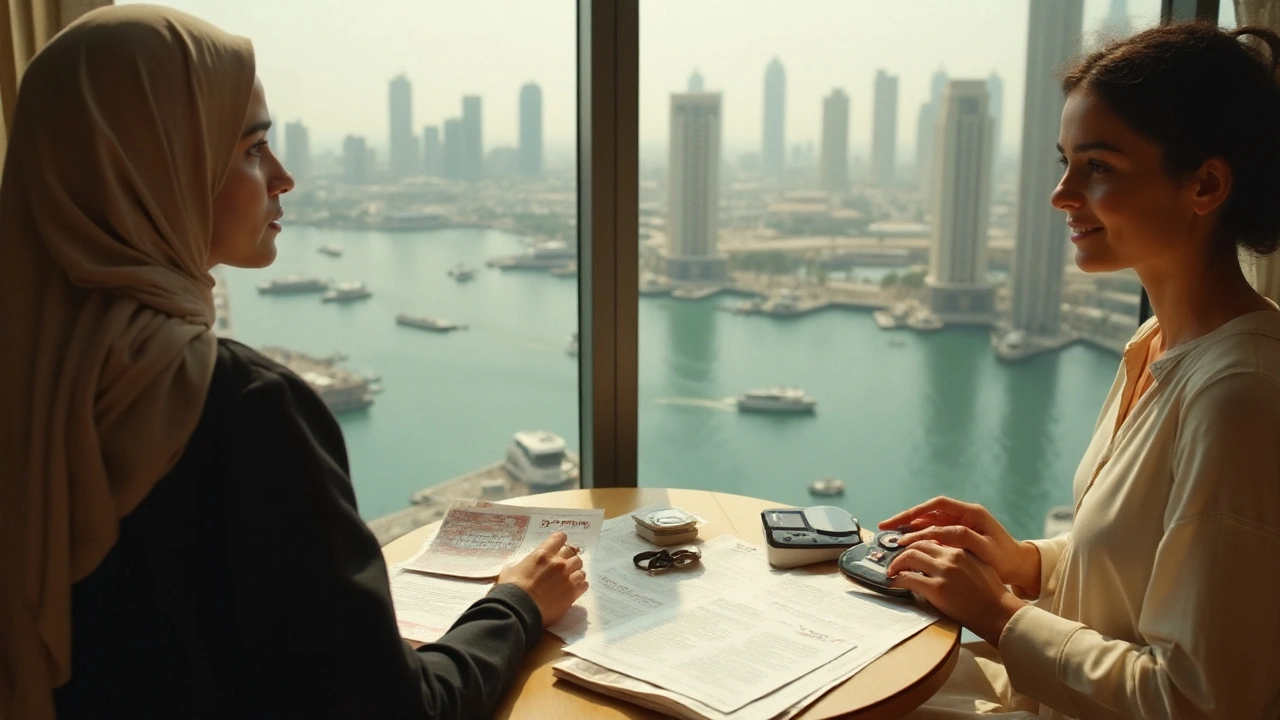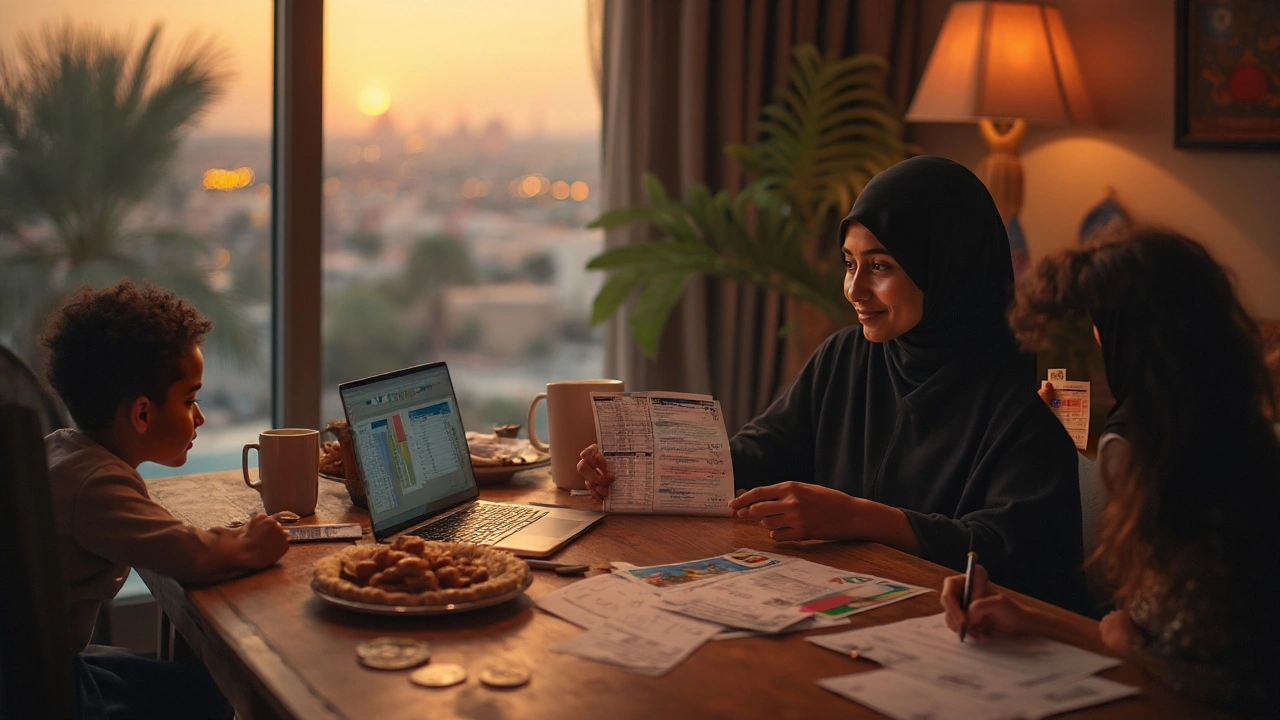
Dubai can feel affordable or eye-watering-depends on where you live and how you spend. If you clicked in hoping for a straight answer, here it is: rent is the boss. Get rent right and Dubai works; get it wrong and your budget melts in the summer heat. Below is the price reality for 2025, with clear monthly budgets, neighborhood rent ranges, and the fees nobody tells you about until it’s too late. I’ll also show you the quick tests I use to decide if an offer is strong enough to relocate.
- TL;DR - Key takeaways
- Comfortable monthly budgets (AED): Single 9.5k-14k; Couple 17k-28k; Family of 4 (with mid-tier school) 35k-55k. Thrifty or luxury lifestyles swing this a lot.
- Rent eats 35-45% of costs. 1-bed rents: JVC 55k-80k/year, Business Bay 85k-130k, Dubai Marina 90k-140k, Downtown 110k-170k.
- One-off move-in costs land around 15k-35k AED for most tenants (deposit, agency fee, DEWA, Ejari, chiller, furniture, moving).
- No income tax, but 5% VAT applies to most purchases and a 5% housing fee is billed monthly via DEWA for tenants.
- Salary sanity check: Single living well from 18k AED/month; Couple from 25k; Family from 40k+ (add 3.5k-8k per child per month for school).
What it really costs each month in 2025
First, a quick yardstick. The UAE dirham (AED) is pegged to the US dollar at roughly 3.6725 AED = 1 USD. When you see figures below, you can sanity-check in dollars fast.
Dubai sits among the pricier expat cities globally in 2025. Mercer’s Cost of Living Survey keeps it in the top tier; Dubai Statistics Center’s CPI updates show steady inflation through 2024 and into 2025, with housing the main driver. Numbeo’s mid-2025 data lines up with that picture: rent is the swing factor, while groceries and transit are mid-range by global big-city standards. That’s why I anchor everything around rent.
Use this one rule before you peek at any gorgeous waterfront listing: keep rent within 30-35% of take-home cash. If an offer forces you above 40%, you’ll feel squeezed. If your employer includes housing allowance, treat it as cash and apply the same rule.
Now, the budgets. These ranges describe typical 2025 spending for different lifestyles. They include rent, utilities, transport, food, phone/internet, healthcare top-ups, and some fun. They don’t include long-haul travel or big-ticket shopping.
- Single (thrifty, sharing or studio in older area): 5,500-8,000 AED/month
- Single (comfortable 1-bed in mid-market area): 9,500-14,000 AED/month
- Single (upscale 1-bed in prime area, frequent dining out): 18,000-30,000 AED/month
- Couple, no kids (thrifty 1-bed in value area): 11,000-18,000 AED/month
- Couple, no kids (comfortable 1-2 bed in central area): 17,000-28,000 AED/month
- Couple, no kids (upscale 2-bed in prime, car + eating out): 30,000-50,000 AED/month
- Family of 4 (value 2-3 bed, careful spending): 22,000-35,000 AED/month (add school if applicable)
- Family of 4 (comfortable 3-bed, mid-tier schools): 35,000-55,000 AED/month
- Family of 4 (upscale 3-4 bed, prime area, top schools): 60,000-100,000 AED/month
School fees move the goalposts. Mid-tier international schools commonly run 40k-70k AED per child per year; top-tier can push 90k-110k+. Spread monthly, that’s 3.5k-9k AED per child. Nurseries are 18k-45k AED per year depending on hours.
Where the money goes most months:
- Rent (monthlyized): 30-45%
- Food and dining: 15-25%
- Transport (including car, fuel, Salik, parking, or metro): 8-15%
- Utilities + Internet + mobile: 7-12%
- Schooling (if any): 0-35%
- Leisure/fitness/personal care: 5-10%
- Insurance top-ups/healthcare out-of-pocket: 2-5%
Neighborhood rent snapshot (annual, 2025):
- 1-bed apartments: Jumeirah Village Circle (JVC) 55k-80k; Dubai Silicon Oasis 55k-85k; JLT 85k-120k; Business Bay 85k-130k; Dubai Marina 90k-140k; JBR 120k-180k; Downtown 110k-170k.
- 2-bed apartments: JVC 75k-110k; JLT 110k-160k; Business Bay 120k-180k; Marina 130k-200k; Downtown 160k-260k.
- Villas/townhouses: The Springs 160k-220k (3-bed); Mirdif 140k-200k (3-4 bed); Arabian Ranches 220k-350k+; Dubai Hills 230k-380k+.
Market trend, mid-2025: After sharp rises in 2023-2024, apartment rents are increasing at low single digits; villa rents cooled slightly from their peak. (CBRE and Dubai Land Department market notes echo this pattern.) You can still negotiate-but better in off-peak leasing months and on older stock.
Quick translation of annual rent to monthly: divide by 12; but remember you’ll likely pay quarterly cheques (or occasionally 1-2 cheques for better rates). Many landlords trade lower price for fewer cheques.
Salary sense-checks (monthly AED, base + allowance):
- New grad/early career: 8k-15k
- Teachers: 12k-20k (often with housing or school fee discounts)
- Nurses/allied health: 8k-15k
- Middle management/marketing/ops: 18k-35k
- Software engineers: 22k-45k
- Finance/consulting managers: 35k-80k+
Rule I use: if your base is below 18k as a single, you’ll need either shared housing or serious discipline. For families, think 40k+ before school fees to feel comfortable, unless housing is included. Remember, there’s no income tax, but you still want a savings buffer and travel money.
One more sanity check-the 30/30 rule: Keep rent at ≤30-35% of income, and aim to save 20-30% monthly. If the math doesn’t work in your current neighborhood, shift the neighborhood, not your savings target.

The breakdown: housing, bills, transport, food, health, school, and the stealth charges
Housing is the big fork in the road. Beyond the base rent, Dubai has a few line items newcomers don’t expect. Note these so you aren’t blindsided.
Recurring housing costs:
- Rent: see ranges above.
- Housing fee: Dubai Municipality charges tenants about 5% of annual rent, billed monthly via DEWA (your utilities account).
- Chiller (district cooling): Sometimes included, sometimes not. If not included, budget 300-700 AED/month for a 1-2 bed; villas usually have standard A/C, not chiller.
- Maintenance: Landlords handle structure; tenants handle minor fixes. Older buildings can mean more call-outs.
Utilities and comms:
- DEWA (electricity/water): Studio/1-bed: 250-450 AED in winter, 500-900 AED in summer. 2-bed: 600-1,200 AED (summer at the top). Villas: 1,200-2,500 AED+ in summer depending on size and thermostat habits.
- Internet (home): 300-450 AED/month for 500 Mbps-1 Gbps packages.
- Mobile: 125-300 AED/month per person depending on data and roaming add-ons.
Transport:
- Metro/bus: 3-8.5 AED per trip by zone; monthly pass around 350 AED for regular commuters.
- Taxis: typical city rides 25-70 AED; airport to Marina 80-120 AED off-peak.
- Ride-hailing: slightly above taxi rates, surges during peak.
- Car: Fuel averages ~3 AED/litre in 2025 with monthly swings. Insurance 1,200-4,000 AED/year depending on car/driver. Registration/testing ~500-1,200 AED/year. Salik (toll) 4 AED per gate; parking 2-10 AED/hr in many zones. A modest sedan financed new can mean 1,200-1,700 AED/month; used cars cut that in half.
Groceries and dining:
- Groceries (single): 900-1,500 AED/month with home cooking.
- Groceries (couple): 1,800-2,800 AED/month.
- Family of 4: 2,500-4,500 AED/month depending on brands and stores.
- Mid-range meal: 50-100 AED per person; brunches 250-450 AED.
- Coffee: 18-22 AED; pint of beer in licensed venues: 45-60 AED (happy hours help).
Healthcare and insurance:
- Dubai requires employers to cover basic health insurance for employees; dependents must be insured too. Basic plans for dependents can be 800-1,500 AED/year; more comprehensive 3,000-8,000 AED per adult.
- Doctor visit copays (out-of-pocket): 50-150 AED on insured plans; 150-400 AED without coverage.
- Dental and maternity often need higher-tier plans or top-ups-check before you move.
Schooling (if you need it):
- Mid-tier international schools: 40,000-70,000 AED/year per child.
- Top-tier: 90,000-110,000+ AED/year.
- Nursery: 18,000-45,000 AED/year depending on hours and location.
Visas and other admin:
- Work residency usually sponsored by employer.
- Dependent visas (spouse/kids) including medicals and Emirates ID: often 4,000-7,000 AED per person when you include appointments and typing center fees.
- Golden Visa is a different, pricier path aimed at investors/professionals-ask HR or a licensed PRO if your profile fits.
One-off move-in costs to expect:
- Security deposit: 5% of annual rent (unfurnished) or ~10% (furnished), refundable.
- Agency fee: 2-5% of annual rent (commonly 5%), plus VAT.
- Ejari (tenancy registration): ~155 AED.
- DEWA deposit: ~2,000 AED (apartment) or ~4,000 AED (villa), refundable; connection fees apply.
- Chiller deposit/activation (if applicable): 1,000-2,000 AED typical.
- Move + basic furniture + appliances: 4,000-15,000 AED for a minimalist setup; much more if you kit it out in one go.
Hidden-in-plain-sight costs:
- Service charges (owners only): If you buy, annual building service fees apply.
- Bank fees on cheques/late payments: avoid these-read your lease timing carefully.
- Entertaining and alcohol: Licensed venues carry high markups. Buying from licensed shops with a (free) alcohol license cuts costs, and duty-free on arrival helps.
Heuristics that actually save money:
- Pick the home by commute, not the view. Shaving 30 minutes of driving each way saves hundreds in Salik, parking, and fuel-and a chunk of your sanity.
- Target “chiller free” buildings or newer, well-insulated stock. The monthly difference in summer is real.
- Test the AC before signing-set 22°C for 15 minutes during viewing; listen for noise, check vent airflow in all rooms.
- For groceries, Union Coop and Lulu are budget-friendly; Waitrose/Spinneys are premium. Mix and match.
- Stack discounts: The Entertainer/merchant apps and weekday dining deals slash restaurant bills by 30-50%.
- Car-free is viable near the Metro (Marina/JLT/DIFC/Business Bay). If you must drive, group errands to dodge multiple Salik gates.
- Annual rent upfront can shave 5-10% off; if cashflow is tight, 4 cheques is the sweet spot between price and flexibility.
If you’re comparing cities, here’s the quick vibe-check: Compared with London or New York, Dubai rent for new-ish builds can be similar for prime zones and cheaper for outlying areas; groceries are comparable; transport is cheaper if you use the Metro; electricity is higher thanks to AC; dining and alcohol in venues are expensive without deals.

Your plan: budgets, checklists, FAQs, and next steps
Build your Dubai number in five minutes. Grab a notepad and run this mini-calculator:
- Take-home income (per month): write it down.
- Max rent (30-35% rule): multiply income by 0.3. That’s your target rent net of allowances.
- Pick area by that rent: use ranges above to shortlist 2-3 neighborhoods.
- Add fixeds: utilities (700-1,200 apartment; 1,200-2,500 villa summer), internet (350), phones (250 per line), transport (350 metro pass or 1,200-2,000 car+fuel+parking), groceries (see household size), health top-ups (250-600), housing fee (5% rent/12).
- Add school per child if relevant (3.5k-9k/month).
- See what’s left. If savings are under 20%, adjust rent or car choices first, not groceries-you’ll hate life if you penny-pinch every meal.
One-off move-in checklist (most tenants):
- Security deposit (5-10% annual rent)
- Agency fee (~5% annual rent + VAT)
- DEWA deposit (2,000 apartment / 4,000 villa)
- Ejari ~155 AED
- Chiller setup/deposit if applicable
- Move + essentials (kitchenware, curtains, lamps-many flats come bright but bare)
- Renter’s insurance (150-500 AED/year, worth it)
Quick decision guide-“Is my offer enough?”
- Single under 15k AED/month: plan for shared housing or a studio in older areas, Metro reliance, strict dining budget.
- Single 18k-30k: comfortable 1-bed in a mid-market or central area, some dinners out, decent savings.
- Couple 25k-40k: 1-2 bed in central/mid-market, a car if needed, travel budget, 15-30% savings possible.
- Family 40k-70k: 2-3 bed with mid-tier school(s), car, activities; savings vary by school choice.
Rent negotiation playbook:
- Know the comps: three active listings in the same tower or next door within the last two weeks.
- Trade cheques for price: fewer cheques = better discount in many cases.
- Ask for fridge/washer or repaint rather than price if landlord resists discounts.
- Time it: late summer and mid-December can be easier for negotiations.
Mini-FAQ
- Is Dubai more expensive than London or New York? For rent in prime areas, it’s in the same ballpark; for outer areas, Dubai can be cheaper. Transport can be cheaper; electricity is higher due to AC; going out (with alcohol) is pricey without deals.
- Can I live well on 10k AED? Yes, if you share a flat, cook at home, and rely on the Metro. Expect modest savings.
- What salary do I need to save real money? Singles usually start saving meaningfully from 18k-22k AED; couples from 25k-35k; families depend on school fees more than anything.
- Are there taxes? No personal income tax. Expect 5% VAT on most goods/services and a 5% housing fee via DEWA for tenants.
- Is a car necessary? Not if you live near the Metro or have a short commute. If your work is in areas like JAFZA or mixed-site roles, a car is practical.
- Can I share accommodation? Many do. Just ensure your lease allows it and everyone is registered if required.
- How often is rent paid? Commonly 4 cheques (quarterly). Fewer cheques can mean a better price; monthly is rarer and can cost more.
- Will my employer cover health insurance? By law in Dubai, employers must provide a basic plan for employees; confirm what it includes and budget top-ups, especially for dental and maternity.
- What about end-of-service benefits? Private-sector employees accrue gratuity instead of a pension, often 21-30 days’ basic salary per year of service after the first year. Some free zones offer savings schemes. Don’t rely on this for short-term cashflow.
- Is 2025 rent rising? Apartment rents are growing slowly after big 2023-2024 jumps; villa rents have eased from peaks. Always check fresh listings-micro-markets move differently.
Pro tips to lock in value:
- View at 2 p.m. in summer-if the AC keeps up then, it’ll keep up always.
- Ask about chilled water billing and recent average bills from the previous tenant.
- Use your first grocery runs to stock staples at value chains, then treat yourself elsewhere.
- Stack lifestyle hacks: weekday beach clubs, ladies’ nights, and 2-for-1 apps shave hundreds off monthly fun without killing it.
Practical examples-plug-and-play budgets
- Single, Business Bay 1-bed at 110k/year (9,166/month): Rent 9,166; housing fee ~381; DEWA 700 (avg); internet 350; mobile 200; transport 600 (mix taxi/metro); groceries 1,200; eating out 900; gym 250; health top-ups 300; misc 600. Total ≈ 14,647 AED/month. Needed income to save 20%: ~18.5k-20k.
- Couple, JVC 2-bed at 90k/year (7,500/month): Housing fee ~313; DEWA 800; internet 350; mobiles 400; car+fuel+parking+Salik 1,600; groceries 2,200; dining 1,200; gym 400; health top-ups 500; misc 800. Total ≈ 15,763 AED/month. Comfortable income: 25k-30k to save well.
- Family of 4, Springs 3-bed at 200k/year (16,667/month): Housing fee ~694; DEWA 1,800 (summer avg); internet 350; mobiles 500; two cars/transport 2,800; groceries 3,500; dining/activities 2,000; schools (2 x 5,000) 10,000; health top-ups 1,000; misc 1,500. Total ≈ 40,811 AED/month. Comfortable income: 55k+.
Last sanity check: put your numbers into the 30/30 framework and see where the squeeze lands-if it’s food and transport, you can fix it; if it’s rent and school, change those inputs or ask for a bigger package.
Next steps by persona
- Young professional: Shortlist JVC, Silicon Oasis, older Bur Dubai/Deira stock near metro lines. Aim for 4 cheques. Use a monthly Metro pass. Cap dining at 2-3 nights out a week; save with weekday deals.
- Couple, no kids: Decide car vs. Metro first; that decides where you live. If you want Marina/JLT lifestyle, budget 1.3-1.8k for car costs or plan to go Metro-first.
- Family: Tour schools before homes. Lock the school, then pick a neighborhood within 20 minutes of it. Ask HR about education allowance and medical plan tier.
- Remote worker: Live near the Metro and co-working. Buy annual co-working if you’ll use it 3+ days/week-it’s cheaper than pay-as-you-go and helps routine.
Checklist to close out a lease confidently
- Verify title deed and landlord ID with the broker present.
- Get everything in writing: chiller terms, included appliances, repainting, minor maintenance caps.
- Walkthrough video at key handover; note meter readings.
- Confirm Ejari timing, cheque schedule, and deposit return conditions.
- Ask for recent average summer DEWA and any service disruptions noted by security/concierge.
Credibility notes: For 2025, data points here reflect Dubai Land Department trends, CBRE’s UAE market summaries, Dubai Statistics Center CPI updates, and cross-checks with current listings in common expat areas. Price ranges are conservative mid-2025 snapshots; micro-markets change quickly, so always check live listings the week you negotiate.
Bottom line: If you anchor your plan on rent, keep a lid on utilities, and play the discount game for dining and leisure, Dubai can be a fun, high-savings city-especially without school fees. If you’re moving with kids, let school and commute decide your map, not the sea view on Instagram.
Oh-and one SEO-friendly note for anyone searching this later: Yes, the cost of living Dubai 2025 is high in the prime zones, but smart choices can halve your rent without halving your lifestyle.
Dubai Escort